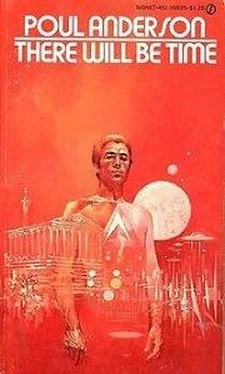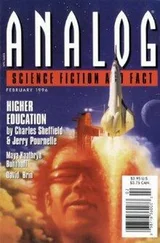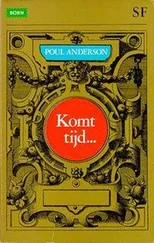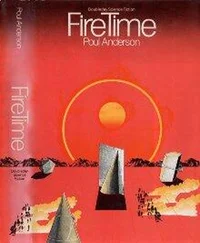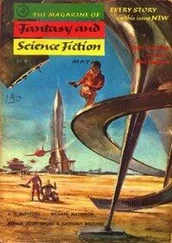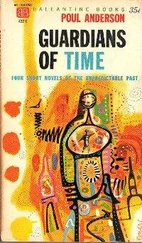Poul Anderson - There Will Be Time
Здесь есть возможность читать онлайн «Poul Anderson - There Will Be Time» весь текст электронной книги совершенно бесплатно (целиком полную версию без сокращений). В некоторых случаях можно слушать аудио, скачать через торрент в формате fb2 и присутствует краткое содержание. Год выпуска: 1972, Издательство: Doubleday, Жанр: Фантастика и фэнтези, на английском языке. Описание произведения, (предисловие) а так же отзывы посетителей доступны на портале библиотеки ЛибКат.
- Название:There Will Be Time
- Автор:
- Издательство:Doubleday
- Жанр:
- Год:1972
- ISBN:нет данных
- Рейтинг книги:5 / 5. Голосов: 1
-
Избранное:Добавить в избранное
- Отзывы:
-
Ваша оценка:
- 100
- 1
- 2
- 3
- 4
- 5
There Will Be Time: краткое содержание, описание и аннотация
Предлагаем к чтению аннотацию, описание, краткое содержание или предисловие (зависит от того, что написал сам автор книги «There Will Be Time»). Если вы не нашли необходимую информацию о книге — напишите в комментариях, мы постараемся отыскать её.
Nominated for Hugo Award for Best Novel in 1973.
There Will Be Time — читать онлайн бесплатно полную книгу (весь текст) целиком
Ниже представлен текст книги, разбитый по страницам. Система сохранения места последней прочитанной страницы, позволяет с удобством читать онлайн бесплатно книгу «There Will Be Time», без необходимости каждый раз заново искать на чём Вы остановились. Поставьте закладку, и сможете в любой момент перейти на страницу, на которой закончили чтение.
Интервал:
Закладка:
But in certain instances — and only a comparative few would be accessible to the Eyrie commandos; they hadn’t many man-months to spend on this job — Havig saw marauders frightened off, or cut down if need be, by submachine gun fire. The spectacle did not make him gloat. However, he knew a chilly satisfaction while he recorded the spot.
From it, the Eyrie men would cart their loot. They were dressed in conqueror style. Amidst this confusion, it was unlikely they would attract notice. A ship was arranged for, to bear the gains to a safe depot.
They would take care of the dwellers, Krasicki had promised. What to do would depend on circumstances. Some families need simply be left unharmed, with enough money to carry on. Others must be guided elsewhere and staked to a fresh beginning.
Paradoxes need not be feared. The tale of how veritable saints — or demons, if one was a Frank — had rescued so-and-so might live a while in folklore but would not get into any chronicle. Writers in Constantinople must be cautious for the next fifty-seven years, until Michael Paleologus ended the Latin kingdom and raised a ghost of Empire. By then, anecdotes would have been lost.
Havig didn’t look into the immediate sequels of these agent actions. Besides the prohibition laid on him, he already was overburdened. Many sights he witnessed sent him fleeing downtime, weeping and vomiting, to sleep till he had the strength to continue.
The Manasses home was among the earliest he investigated. It wasn’t quite the first; he wanted to gain experience elsewhere; but he knew he was going to be dulled later on.
He had cherished a hope it might be entirely overlooked. Some of his points were. It being unfeasible to check the Crusaders in the famous places, he had investigated lesser ones, whose aggregate wealth was what counted. And Constantinople was too big, too labyrinthine, too rich and strange for the pillagers to break down every door.
He felt no extreme fears. In this particular case, something would be done if need be, by himself if nobody else, and Caleb Wallis could take his destiny and stuff it. Nevertheless, when Havig from his alley saw a dozen filthy men lope toward that open entrance, the heart stumbled within him. When lead sleeted from it, and three Franks fell and were quiet, two lay sprattling and shrieking, and the rest howled and fled, Havig cheered.
His return was a sizable operation in itself.
Between the radioactivity and the time uncertainty, he couldn’t proceed up to dead Istanbul and hunt around for an agreed-on hour at which the aircraft would meet him. Nor could he appear in an earlier epoch — the Eyrie’s planes were not available then — or at a later one — the site would be reoccupied. He’d look too peculiar, and would still have the problem of reaching a geographical point where contact could be made.
“Now you tell me!” he muttered to himself. For a while he marveled that the obvious answer hadn’t occurred when this whole project was being discussed. Use his twentieth-century persona. Cache some funds and clothes in a contemporary Istanbul hotel; feed the management a line about being involved in production of a movie; and there he was, set.
Well, he’d been overwhelmed by things to think about. And the idea hadn’t come to anyone else. While Wallis employed some gadgets developed in the High Years, he and his lieutenants were nineteenth-century men who had organized an essentially nineteenth-century operation.
The plan called for Havig to double back downtime, make more money if he had to, engage passage on a ship to Crete, there find a specific isolated spot, and project himself uptime.
Actually, effort, cramped quarters, dirt, noise, smells, moldy hardtack, scummy water, weird fellow passengers, and all, he didn’t care. He needed something to take his mind off what he had seen.
“Splendidly done,” Krasicki said across the written report. “Splendidly. I’m sure the Sachem will give you public praise and reward, when next your two time-lines intersect.”
“Hm? Oh. Oh, yeah. Thanks.” Havig blinked.
Krasicki studied him. “You are exhausted, are you not?”
“Call me Rip van Winkle,” Havig muttered.
Krasicki understood his gauntness, sunken eyes, slumped body, tic in cheek, if not the reference. “Yes. It is common. We allow for it. You have earned a furlough. In your home milieu, I suggest. Never mind about the rest of the Constantinople business. If we need more from you, we can always ask when you return here.” His smile approached warmth. “Go, now. We’ll talk later. I think we can arrange for your girl friend to accompany-Havig? Havig?”
Havig was asleep.
His trouble was that later, instead of enjoying his leave, he started thinking.
10
HE WOKE with his resolve crystallized. It was early. Light over the high rooftops of the Rive Gauche, Paris, 1965, reached gray and as cool as the air, which traffic had not yet begun to trouble. The hotel room was shadowy. Leonce breathed warm and tousle-haired beside him. They had been night-clubbing late — among the chansonniers, which he preferred, now that her wish for the big glittery shows was slaked — and come back to make leisured and tender love. She’d hardly stir before a knock, some hours hence, announced coffee and croissants.
Havig was surprised at his own rousing. Well, more and more in the past couple of weeks, he’d felt he was only postponing the inevitable. His conscience must have gotten tired of nagging him and delivered an ultimatum.
Regardless of danger, he felt at peace, for the first time in that whole while.
He rose, washed and dressed, assembled his gear. It lay ready, two modules within his baggage. There was the basic agent’s kit, an elaborated version of what he had taken to Jerusalem plus a gun. (The Eyrie’s documents section furnished papers to get that past customs.) He had omitted items Leonce had in hers, such as most of the silver, in order to save the mass of the chronolog. (He had unobtrusively taken it back with him on this trip. She asked him why he lugged it around. When he said, “Special electronic gear,” the incantation satisfied her.) Passport, vaccination certificate, and thick wallet of traveler’s checks completed the list.
For a minute he stood above the girl. She was a dear, he thought. Her joy throughout their tour had been a joy to him. Dirty trick, sneaking out on her. Should he leave a note?
No, no reason for it. He could return to this hour. If he didn’t, well, she knew enough contemporary English and procedure, and had enough funds, to handle the rest. (Her own American passport was genuine; the Eyrie had made her a birth certificate.) She might perhaps feel hurt if she knew what had gotten him killed.
Chances were he was simply courting a reprimand. In that case, she’d hear the full story; but he’d be there to explain, in terms of loyalty which she could understand.
Or would it much matter? That she called him “darlya” and spoke of love when he embraced her was probably just her way. Lately, though, she’d been holding his hand a lot when they were out together, and he’d caught her smiling at him when she thought he wasn’t noticing… He was a bit in love with her too. It could never last, but while it did — He stooped. “So long, Big Red,” he whispered. His lips brushed hers. Straightening, he picked up his two carrying cases and stole from the room. By evening he was in Istanbul.
The trip took this many hours out of his lifespan, mostly spent on the plane and airport buses. Time-hopping around among ticket agencies and the like made the calendrical interval a couple of days. He had told me through a wry grin: “Know where the best place usually is for unnoticed chronokinesis in a modern city? Not Superman’s telephone booth. A public lavatory stall. Real romantic, huh?”
Читать дальшеИнтервал:
Закладка:
Похожие книги на «There Will Be Time»
Представляем Вашему вниманию похожие книги на «There Will Be Time» списком для выбора. Мы отобрали схожую по названию и смыслу литературу в надежде предоставить читателям больше вариантов отыскать новые, интересные, ещё непрочитанные произведения.
Обсуждение, отзывы о книге «There Will Be Time» и просто собственные мнения читателей. Оставьте ваши комментарии, напишите, что Вы думаете о произведении, его смысле или главных героях. Укажите что конкретно понравилось, а что нет, и почему Вы так считаете.
